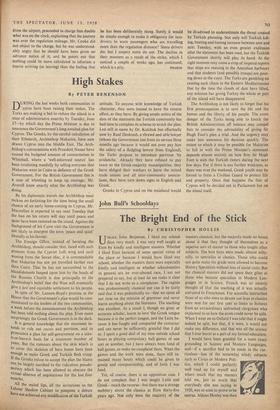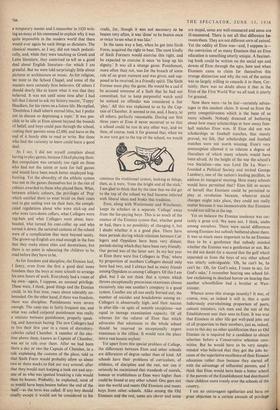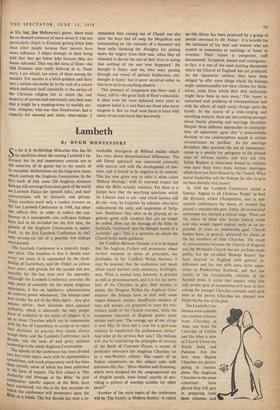John Bull's Schooldays
The Bright End of the Stick
By CHRISTOPHER HOLLIS
NLIKE John Betjeman, I liked my school- days very much. I was very well taught at Eton by kindly and intelligent masters. Whether I liked Eton because of some, special virtue of the place or because I would have liked any school, whether the masters there were especially kindly and intelligent or whether schoolmasters in general are an over-abused race, I am not prepared to say, but at least let me make it clear that I do not write as a complainer. The regime was predominantly classical nor can it be fairly said that it was pedantically so—that we spent all our time on the minutia of grammar and never learnt anything about the literature. The teaching was excellent. As a result I, though no great or accurate scholar, learnt to love 'the Greek tongue because it is the perfect tongue, and the Latin be- cause it has fought and conquered the centuries' and can never be sufficiently grateful that I did so. I spent a good deal of my time outside school hours in playing compulsory ball games of one sort or another, but I have always been fond of ball games, so make no complaint there. When the games and the work were done, there still re- mained many hours which could be given to gossip and companionship, and of both I was fond.
Yet, of course, there is an opposition case. I do not complain that I was taught Latin and Greek—much the reverse—but there was a strange snobbery about the classics at Eton thirty-five years ago. Not only were the majority of the masters classical, but the majority made no bones about it that they thought of themselves as a superior sort of master to those who taught other subjects. The best boys were made, almost willy- nilly, to specialise in classics. Those who could not quite make the grade were allowed to become History Specialists without loss of social caste. But the classical masters did not spare their gibes at those who became specialists in Modern Lan- guages or in Science. French was so meanly thought of that the teaching of it was actually entrusted to Frenchmen. For scientific instruction those of us who were to devote our lives to classics were sent for our first year to listen to lectures from an extraordinary unfrocked clergyman who explained to us how the atom could never be split. When I went on to Oxford I was told that it might indeed be split, but that, if it were, it would not make any difference, and that was all the science that I ever learnt as a part of my formal education. a temporary master and I remember in 1920 writ- ing an essay at his commend to explain why it was quite impossible in the modern world that there would ever again be such things as dictators. The classical masters, as I say, did not teach pedanti- cally, and, while they were teaching us Greek and Latin literature, they contrived to tell us a good deal about English literature—for which I am grateful. But we were told surprisingly little about pictures or architecture or music. As for religion, we went to the School Chapel, and some of the masters were certainly firm believers. Of others I should dearly like to know what it was that they believed. It was not until some time after I had left that I dared to ask my history master, `Tuppy' Headlam, for his views on a future life. He replied, `Doubtless I shall inherit eternal bliss, but I prefer not .to discuss so depressing a topic.' It was pos- sible to be idle at Eton almost beyond the bounds of belief, and boys could pass through the school, costing their parents some £2,000, and leave at the end of it barely able to read or write. But those who had the curiosity to learn could learn a good deal.
As I say, I did not myself complain about having to play games, because I liked playing them. But compulsion was certainly too rigid on those who had not the talent or taste for ball games and would have been much better employed bug- hunting. Yet the absurdity of the athletic system was not in the games themselves but in the riot of colours awarded to those who played them. What, between athletic colours, the privileges of 'Pop' which entitled them to wear braid on their coats and to put sealing wax on their hats, the compli- cated regulations about who wore stick-up and who wore turn-down collars, what Collegers wore top-hats and what Collegers went about bare- headed, who turned his coat-collar up and who turned it down, the sartorial customs of the school were of a complication that went beyond sanity. The grown-up English are mad enough in the fuss that they make about titles and decorations, but there is no point in educating the children to be mad before they have to be.
As for freedom and discipline, the Etonian had, I fancy, even from the first a good deal more freedom than the boys at most schools to arrange his own hours of work. Everybody had a room of his own—again, I suppose, an unusual privilege. These were, I think, good things and the Etonian could, in his free time, roam about tolerably un- bounded. On the other hand, if there was freedom, there was discipline. Punishments were severe enough. The cane was in'fairly frequent use, and what was called corporal punishment was really a mixture between punishment, properly speak- ing, and American hazing. The new Collegers had to live their first year in a room of dormitory- cubicles called Chamber. A member of the elec- tion above them, known as Captain of Chamber, was set to rule over them. After we had been there a day or two the Captain of Chamber, in a talk explaining the customs of the place, told us that Sixth Form would probably allow us about two or three weeks to find our way around; after that they-would start keeping a look out and any- one of us who was spotted breaking a rule would then be beaten. Probably, he explained, most of us would have been,beaten before the end of the 'half'—as the term was called. If any boy should totally escape it would not be considered to his credit, for, 'though it was not necessary to be beaten very often, it was 'done' to be beaten once or twice `to see what it was like.'
In the same way a boy, when he got into Sixth Form, acquired the right to beat. The most kindly of Sixth Formers would exercise this right, and be expected to exercise it once `to keep up his dignity.' It was all a strange game. Punishment, more often than not, was for the breach of some rule of no great moment and was given, and sup- posed to be received, in a friendly spirit. The Sixth Former must play the game. He would be a cad if he accused someone of a fault that he had not committed, but to keep purposeful watch until he noticed an offender was considered a fair `ploy.' All this was explained to us by the Cap- tain of Chamber. It seemed to me, and, I fancy, to all others, perfectly reasonable. During our first three years at Eton it never occurred to us that a school could be run in any other way, and we then, of course, took it for granted that, when we in our turn got to the top of the school, we would continue the traditional system, looking at things, then, as it were, `from the bright end of the stick.' I am glad to think that by the time that we did get to the top of the school we had become infected with liberal ideas and broke this tradition.
Eton, along with Westminster and Winchester, keeps its scholars in a separate 'College' away from the fee-paying boys. This is so much of the essence of the Etonian system that, whether good or bad, there is no possibility of changing it, but I doubt whether it is a good plan. There have been periods during which relations between Col- legers and Oppidans have been very distant, periods during which they have been very friendly. Our period was of the latter sort. In my last year at Eton there were five Collegers in 'Pop,' where by proportion of numbers Collegers should only have had two, and I always had as many friends among Oppidans as among Collegers. Of this I am glad, but I do not think that a system which throws exceptionally precocious examinees almost excusively into one another's company is a good system. Candles are all too easily burned out; the number of suicides and breakdowns among ex- Collegers is abnormally high, and their success in after-life—in spite of notable exceptions—not equal to teenage examination capacity. Of all schemes for the reform of Eton that which advocates that admission to the whole school should be reserved to exceptionally expert examinees is the silliest. It would turn the place into a vast lunatic asylum.
Yet apart from this special problem of College, the differences between Eton and other schools are differences of degree rather than of kind. All schools have their problems of curriculum, of athletics, of discipline and the rest, nor can it seriously be maintained that standards of morals, honour or truthfulness at Eton were higher than could be found at any other school. One gqes out into the world and meets Old Etonians and meets boys from other schools. Alike among the Old Etonians and the rest, some are clever and some are stupid, some are well-mannered and some are ill-mannered. There is not all that difference be- tween them. They are not different sorts of animal. Yet the oddity of Eton was—and, I suppose is— the conviction of so many Etonians that an Eton education is something utterly unique. A fascinat- ing book could be written on the social ups and downs of Eton through the ages, how and when Etonians came to claim for themselves this strange distinction and why the rest of the nation was so largely willing to concede it to them. Cer- tainly, there was no doubt about it that in the Eton of the First World War we all took it utterly for granted.
Now there were—to be fair—certainly advan- tages in this insolent claim. It saved us from the petty competitiveness which is the bane of so many schools. Nobody dreamed of bothering about how many scholarships or how many foot- ball matches Eton won. If Eton did not win scholarships or football matches, that merely proved, we felt, that scholarships and football matches were not worth winning. Eton's very presumption allowed it to tolerate a degree of liberalism of which many schools would have been-afraid. At the height of the war the school's two Socialists—one was• Lord De La Warr— founded a Political Society and invited George Lansbury, one of the nation's leading pacifists, to address its inaugural meeting. How many schools would have permitted that? Eton felt so secure of herself that Etonians could be permitted to play at revolution because, whatever social changes might take place, they could not really matter because it was inconceivable that Etonians would not still be at the top.
Yet on balance the Etonian insolence was cer- tainly a great evil. We were not, I think, snobs among ourselves. There were social differences among Etonians but nobody bothered about them. It was so much more important to be an Etonian than to be a gentleman that nobody minded whether the Etonian was a gentleman or not. But We did not doubt for a second that the gulf which separated us from the boys of any other school was utterly unbridgeable. `Oh, he can't be, he can't be : Oh, for God's sake, r mean to say, for God's sake,' I remember hearing one school fel- low exclaiming in shocked horror on hearing that another schoolfellow had a brother at West- minster.
Whence arose this strange insanity? It was, of course, true, as indeed it still is, that a quite ludicrously overwhelming proportion of peers, cabinet ministers, rich men and the rest of the Establishment sent their sons to Eton. It was true that Etonians in after life got well-paid jobs out of all proportion to their numbers, just as, indeed, even to this day no other qualification than an Old Etonian tie is required for a candidate to obtain selection before a Conservative selection com- mittee. But he would have to be very simple- minded who believed that they got the jobs be- cause of the superlative excellence of their Etonian education rather than because they started off with the advantage of influential parents, and I think that Eton would have been a better school if the parents of the Establishment had•distributed their children more evenly over the schools of the country.
I am no extravagant egalitarian and have no great objection to a certain amount of privilege in life, but, like Melbourne's garter, there must, be no damned nonsense of merit about it. I do not particularly object to Etonians getting better jobs than other people because their parents have more influence. I object strongly to their being told that they get better jobs because they are better educated. That was the curse of Eton—the Old Etonians who really believed in it. There were, I am afraid, too many of them among the masters. For success is a bitch-goddess and there was a certain inevitable lie in the soul of a school which dedicated itself nominally to the service of the Christian religion but to which the vast majority of parents had notoriously sent their sons that it might be a stepping-stone to worldly suc- cess. Alington, who was then Headmaster, had a capacity for amused and ironic observation. I
remember him 'coming out of Chapel one day after the boys had all sung the Magnificat and commenting on 'the curiosity of a thousand rich boys daily thanking the Almighty for putting down the mighty from their seat, when they all intended to devote the rest of their lives to seeing that nothing of the sort •ever happened.' He thought it funny and we, who were passing through our mood of parlour bolshevism, also thought it funny, but it never occurred either to him or to us to do anything about it.
This pretence of uniqueness was then—and, I fancy, still is—the great fault of Eton's education. It takes even the most balanced some years to outgrow belief in it and there are those who never outgrow it. But the fault went hand in hand with many virtues and much that was lovely.




































 Previous page
Previous page